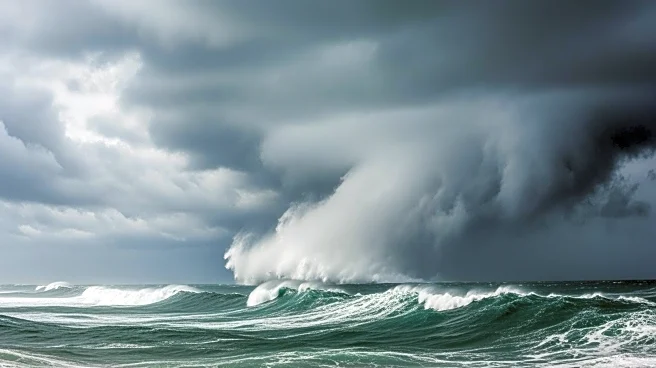What's Happening?
Hurricane Melissa, initially a tropical storm, has rapidly intensified into a major hurricane as it moves towards Jamaica. The storm is expected to become one of the most impactful of the 2025 Atlantic hurricane season. Currently, Melissa is centered
about 145 miles southeast of Kingston, Jamaica, with sustained winds of 75 mph. The hurricane has already caused significant flooding in the Dominican Republic and is blamed for three deaths in Haiti. Forecasts predict that Melissa will reach Category 5 strength by Monday, with sustained winds of 160 mph. The storm is expected to bring torrential rains, with localized rainfall totals potentially exceeding 30 inches in Haiti and 40 inches in Jamaica.
Why It's Important?
The intensification of Hurricane Melissa poses a severe threat to the Caribbean region, particularly Jamaica and Haiti. The expected heavy rainfall and strong winds could lead to catastrophic flooding and landslides, causing extensive infrastructural damage and long-duration power outages. The storm's impact could be devastating for local communities, isolating them and disrupting essential services. The economic implications are significant, as recovery efforts could strain resources and require international aid. The hurricane's potential to reach Category 5 status makes it one of the strongest storms to impact Jamaica in decades, highlighting the urgent need for preparedness and response strategies.
What's Next?
As Hurricane Melissa approaches Jamaica, authorities are likely to issue evacuation orders and prepare emergency response plans to mitigate the storm's impact. The National Hurricane Center predicts that Melissa will make landfall in Jamaica by Monday night or Tuesday morning, followed by southeastern Cuba. The storm's trajectory and intensity will be closely monitored, with potential adjustments to forecasts as it interacts with the region's terrain. Stakeholders, including government agencies and humanitarian organizations, will need to coordinate efforts to provide relief and support to affected areas.
Beyond the Headlines
The development of Hurricane Melissa underscores the increasing frequency and intensity of tropical storms in the Atlantic, potentially linked to climate change. The warm sea surface temperatures and favorable atmospheric conditions contributing to Melissa's rapid intensification may become more common, posing long-term challenges for disaster preparedness and climate resilience in vulnerable regions. The storm also highlights the importance of international cooperation in addressing the impacts of extreme weather events.














